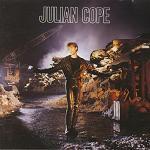
Julian Cope Saint Julian
(Universal)
The mid 80s were not a great time for Julian Cope. Whereas the decade began with him fronting cult post-punk band the Teardrop Explodes, then progressed to him becoming a pop icon, by 1985, he was a joke in the media and his two solo albums had gone nowhere. The second, Fried, featured Cope huddled under a turtle shell on the cover, bringing further ridicule - detracting from what was a brilliant album of English psychedelia.
If you haven't read his memoir of the time Repossessed (and you really should), you won't know these failures left Cope a recluse in his native Tamworth. In the meantime, his old rival Ian McCulloch's band Echo and the Bunnymen had created their Ocean Rain masterpiece and even Pete Wylie (the final part of the Crucial Three) had scored big hits. It seemed Cope was washed up.
Enter Cally Calloman, then working at Cope's record company. It seemed he was the one person who still believed in him and the two made a strong connection to the degree that he was convinced to pack in his job and work for Cope's management company to oversee what would be a major career relaunch that started with getting the man signed to Island Records. From there, the campaign to create what would become Saint Julian began.
First, he needed a band: Chris Whitten, who had previously played with the Waterboys, stayed on from the Fried sessions and teamed up with James Eller to create a steady rhythm section. Lead guitarist Donald Ross Skinner had befriended Cope when he moved back to Tamworth and proved to be not only a great musician, but an important creative presence for the decade to come. With the pieces in place, they were all hooked up with US producer Ed Stasium in 1986, coming back with World Shut Your Mouth - a fantastic bit of rock that somehow only made #19 on the UK singles chart.
No matter - the stars seemed aligned when the subsequent album Saint Julian was set for release the following year. The Bunnymen had decided to stop being interesting in favour of chasing success in the States and the stage was set for Julian Cope to be a star again - an idea showcased on the album cover, contrasting him from being looking vulnerable on Fried to being shown dressed in full leathers with arms open wide in full Rock God pose.
It all worked - in part. Saint Julian is undoubtedly the most outright commercial the man has ever sounded. Removing just about most of the musical eccentricities that had defined him up to that point, it instead gives us a crystal clear production sound from producer (bar three songs with Stasium) Warne Livesey . On the flipside, this means the era-defining snare drum sound and an at-times "cold" feel to the music, an issue rescued by Cope's singing, which was always his weak point. This had never been much of a problem up to this album, but when the album tries to rock out a bit (such as on Pulsar), it stumbles.
Not that it can detract from what is a very fine album. Trampoline and Eve's Volcano were both released as singles and were perfect pop, full of hooks and great playing. The latter of those is one of the few times the album slows down to any degree before the finale A Crack in the Clouds - moving away from his very "English" sound of his first two solo albums to one influenced by American rock acts like Alice Cooper: it wasn't for no reason that Cope's backing band was nicknamed "The Two-Car Garage Band".
Listening a quarter of a century on, with hindsight of where Cope would subsequently go (and is now), it's not hard to understand why the man himself isn't so keen on it: it shines in a 1987 fashion and is clearly an attempt at hitting the charts. In part, it worked: Saint Julian is his best selling album. But, despite all efforts, it stalled at #11 in the charts and neither Trampoline nor Eve's Volcano made a real dent in getting him back on Top of the Pops. On the tour to promote it, Cope's relationship with Calloman fell apart and the band did the same on returning home. The album's follow-up, My Nation Underground, was a complete disaster, leading to a complete rethink on his creative direction.
People with little knowledge of Cope outside of either his work in the Teardrop Explodes or his more thoughtful later work may find Saint Julian confusing in context of the vast majority of his output and in the two times I've seen in him recent years, he played no songs from it. However, it remains a fine piece of guitar pop and in this repackaged reissue, there's a second disc full of b-sides (your mileage may vary, but they're rarely dull) and remixes (not much cop) to tempt you in.
31 January, 2013 - 06:41 — D.C. Harrison